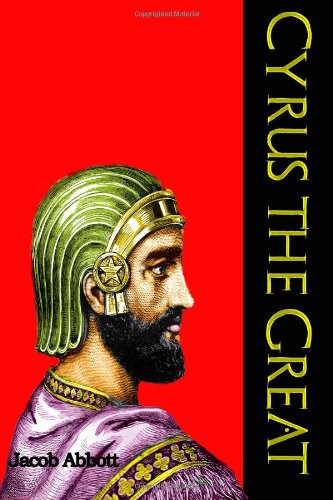-
Cyrus the Great Makers of History
Jacob Abbott
language (, March 30, 2011)This book was converted from its physical edition to the digital format by a community of volunteers. You may find it for free on the web. Purchase of the Kindle edition includes wireless delivery.
-
Cyrus the Great: Makers of History
Jacob Abbott
language (e-artnow, May 15, 2020)"Cyrus the Great" is a biography of Cyrus II of Persia (c. 600-530 BC), the founder of the Achaemenid Empire, the first Persian Empire. Under his rule, which lasted c. 30 years, the empire embraced all the previous civilized states of the ancient Near East, expanded vastly and eventually conquered most of Western Asia and much of Central Asia. From the Mediterranean Sea and Hellespont in the west to the Indus River in the east, Cyrus the Great created the largest empire the world had yet seen. He respected the customs and religions of the lands he conquered, which became a very successful model for centralized administration and establishing a government working to the advantage and profit of its subjects. Cyrus the Great has been known for his innovations in building projects; he further developed the technologies that he found in the conquered cultures and applied them in building the palaces of Pasargadae. He is also well recognized for his achievements in human rights, politics, and military strategy, as well as his influence on both Eastern and Western civilizations.
-
Makers of History - Cyrus the Great: Biographies of Famous People in History
Jacob Abbott
language (WestPub Online, March 8, 2016)Cyrus II of Persia (Old Persian: KUURUUSHA[4] Kūruš; New Persian: کوروش Kurosh ; c. 600 or 576 – 530 BC),[5] commonly known as Cyrus the Great [6] (Persian: کوروش بزرگ, Kourosh-e-Bozorg) and also called Cyrus the Elder by the Greeks, was the founder of the Achaemenid Empire.[7] Under his rule, the empire embraced all the previous civilized states of the ancient Near East,[7] expanded vastly and eventually conquered most of Southwest Asia and much of Central Asia and the Caucasus. From the Mediterranean Sea and Hellespont in the west to the Indus River in the east, Cyrus the Great created the largest empire the world had yet seen.[8] Under his successors, the empire eventually stretched from parts of the Balkans (Bulgaria-Paeonia) and Thrace-Macedonia in the west, to the Indus Valley in the east. His regal titles in full were The Great King, King of Persia, King of Anshan, King of Media, King of Babylon, King of Sumer and Akkad, and King of the Four Corners of the World.The reign of Cyrus the Great lasted between 29 and 31 years. Cyrus built his empire by conquering first the Median Empire, then the Lydian Empire and eventually the Neo-Babylonian Empire. Either before or after Babylon, he led an expedition into central Asia, which resulted in major campaigns that were described as having brought "into subjection every nation without exception".[9] Cyrus did not venture into Egypt, as he himself died in battle, fighting the Massagetae along the Syr Darya in December 530 BC.[10][11] He was succeeded by his son, Cambyses II, who managed to add to the empire by conquering Egypt, Nubia, and Cyrenaica during his short rule.
-
Cyrus the Great: Often Called the King of All Kings
Jacob Abbott, Timeless Classic Books
(CreateSpace Independent Publishing Platform, Jan. 8, 2011)Cyrus the Great (c. 600 BC or 576 BC to December 530 BC), also known as Cyrus II or Cyrus of Persia, was the founder of the Persian Empire. It was under his own rule that the empire embraced all previous civilized states of the ancient Near East, expanded vastly and eventually conquered most of Southwest Asia and much of Central Asia, parts of Europe and Caucasus, from the Mediterranean sea and the Hellespont in the west to the Indus River in the east, to create the largest empire the world had yet seen. The reign of Cyrus lasted between 29 and 31 years. Cyrus built his empire by fighting and conquering first the Median Empire, then the Lydian Empire and the Neo-Babylonian Empire. Either before or after Babylon, he led an expedition into central Asia, which resulted in major campaigns that brought "into subjection every nation without exception." Cyrus did not venture into Egypt, as he himself died in battle, fighting the Massagetae along the Syr Darya in December 530 BC. He was succeeded by his son, Cambyses II, who managed to add to the empire by conquering Egypt, Nubia, and Cyrenaica during his short rule.
-
Makers of History: Cyrus the Great
Jacob Abbott
Paperback (CreateSpace Independent Publishing Platform, May 29, 2014)This collection of literature attempts to compile many of the classic, timeless works that have stood the test of time and offer them at a reduced, affordable price, in an attractive volume so that everyone can enjoy them.
-
Cyrus the Great Makers of History
1803-1879 Abbott, Jacob
language (HardPress, June 23, 2016)HardPress Classic Books Series
-
Cyrus the Great - Makers of History
Jacob Abbott
(FQ Books, July 6, 2010)Cyrus the Great - Makers of History is presented here in a high quality paperback edition. This popular classic work by Jacob Abbott is in the English language, and may not include graphics or images from the original edition. If you enjoy the works of Jacob Abbott then we highly recommend this publication for your book collection.
-
Makers of History. Cyrus the Great
Jacob Abbott
Hardcover (Harper & Brothers, July 5, 1900)None
-
Cyrus the Great Makers of History
Jacob Abbott
(TREDITION CLASSICS, Dec. 13, 2012)This book is part of the TREDITION CLASSICS series. The creators of this series are united by passion for literature and driven by the intention of making all public domain books available in printed format again - worldwide. At tredition we believe that a great book never goes out of style. Several mostly non-profit literature projects provide content to tredition. To support their good work, tredition donates a portion of the proceeds from each sold copy. As a reader of a TREDITION CLASSICS book, you support our mission to save many of the amazing works of world literature from oblivion.
-
Makers of History Cyrus the Great BY JACOB ABBOTT
JACOB ABBOTT
(Independently published, Jan. 7, 2019)Jacob Abbott (November 14, 1803 – October 31, 1879) was an American writer of children's books.On November 14, 1803, Abbott was born in Hallowell, Maine. Abbott's father was Jacob Abbott and his mother was Betsey Abbott. Abbott attended the Hallowell Academy. EducationAbbott graduated from Bowdoin College in 1820. Abbott studied at Andover Theological Seminary in 1821, 1822, and 1824. Abbott was tutor in 1824–1825.CareerFrom 1825 to 1829 was professor of mathematics and natural philosophy at Amherst College; was licensed to preach by the Hampshire Association in 1826; founded the Mount Vernon School for Young Ladies in Boston in 1829, and was principal of it in 1829–1833; was pastor of Eliot Congregational Church (which he founded), at Roxbury, Massachusetts in 1834–1835; and was, with his brothers, a founder, and in 1843–1851 a principal of Abbott's Institute, and in 1845–1848 of the Mount Vernon School for Boys, in New York City.
-
Cyrus the Great Makers of History
Abbott Jacob
(HardPress Publishing, June 23, 2016)Unlike some other reproductions of classic texts (1) We have not used OCR(Optical Character Recognition), as this leads to bad quality books with introduced typos. (2) In books where there are images such as portraits, maps, sketches etc We have endeavoured to keep the quality of these images, so they represent accurately the original artefact. Although occasionally there may be certain imperfections with these old texts, we feel they deserve to be made available for future generations to enjoy.
-
Cyrus the Great: Often Called the King of All Kings
Jacob Abbott
(CreateSpace Independent Publishing Platform, July 6, 1625)None